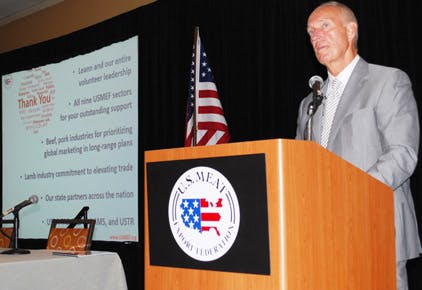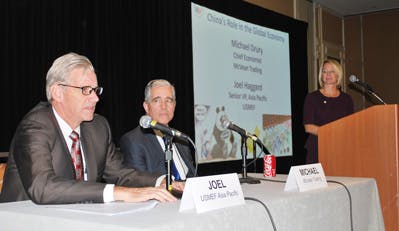USMEF Strategic Planning Conference Kicks off in Tucson

USMEF President and CEO Philip Seng addresses the general session
USMEF’s annual Strategic Planning Conference opened Wednesday in Tucson, Arizona, with an overview of global meat trade issues and a unique perspective on the future of China, a key market for the U.S. meat industry.
USMEF Chair Leann Saunders opened the day's general session by summarizing the accomplishments of the organization and the export challenges faced over the past year, and expressed gratitude to USMEF members and partners for their support.
“In the sessions you will attend this week, you will hear about global demand, production trends, what is happening with our primary competitors and how each of our key export markets are performing,” said Saunders. “This is called the Strategic Planning Conference for a reason.”
Philip Seng, USMEF president and CEO, offered an update on the performance of U.S. beef, pork and lamb exports in 2015 and outlined key issues facing the U.S. meat industry. Seng highlighted top-performing markets and listed some of the successful USMEF promotional efforts during the year, including American-style barbecue in Japan and Korea, positioning U.S. pork as “center-of-the-plate” in Mexico’s hotel and restaurant sector, the largest-ever Latin American Product Showcase in Costa Rica and the inaugural USMEF Sub-Saharan Africa Showcase and Seminar in Ghana. He also noted that USMEF conducted more than 150 educational seminars over the past year, training importers, buyers, chefs and other food industry professionals on the attributes of U.S. beef, pork and lamb.
Seng expressed optimism that the recently completed Trans Pacific Partnership (TPP) agreement will provide opportunities for U.S. meat, but noted that the competitive landscape will remain very intense. He explained that the primary benefits to the U.S. industry will be in Japan, where Australian beef already enjoys reduced tariffs through an economic partnership agreement. Japan is also deep into free trade negotiations with the European Union, the largest competitor for U.S. pork in Japan.
The general session also featured a segment on China’s role in the global economy, which included informative presentations by Michael Drury, chief economist for McVean Trading, and Joel Haggard, USMEF senior vice president for the Asia Pacific.
Drury, who has been with McVean Trading since 1992, discussed the impact China’s well-publicized anti-corruption campaign has had on many industries. He explained that recent developments have caused his outlook on China’s economic future to improve.
“Why do I not worry about China like I did a year ago?” Drury said. “A year ago they didn’t know they made a mistake with a campaign against corruption, but now they know they made a mistake. They are not pulling back on the campaign, but they have pulled back rates and allowed banks to lend more money. They are building more water projects, environmental projects, highways and subway systems. They are opening up markets.”

USMEF’s Joel Haggard and Michael Drury of McVean Trading discuss the state of China’s economy in a session moderated by USMEF Chair Leann Saunders
Haggard spoke about the differences – and similarities – in the Chinese market today compared to 10 years ago.
One big difference, he said, is that China has gone from virtually no food safety regulations to overregulation. He pointed to a recent situation in which USMEF had to scientifically document the marketing claim “grain fed to tenderness.”
Haggard also discussed China’s efforts to modernize its livestock industry and close unlicensed slaughter plants.
On the consumer front, Haggard noted the explosive growth of online food purchasing in China.
“When you look at the Chinese market as a meat exporter, you have to look at the consumer – how people buy food and where they buy it. Technology is changing the way people buy food there.”
Although he is optimistic about the economic future of China, Haggard cautioned that serving the market will require patience.
“China is still going to be a risky market for us in the next five years,” he said.
Thursday’s general session featured an overview of TPP’s implications for U.S. agriculture from Sharon Bomer, assistant U.S. trade representative for agricultural affairs and commodity policy for the Office of the U.S. Trade Representative. This was followed by a session in which staff members from USMEF’s technical services department explained current key regulatory issues facing the U.S. industry.
USMEF’s standing committees – the Beef and Allied Industries Committee, Pork and Allied Industries Committee and Exporter Committee – meet Thursday, as does the Feedgrain and Oilseed Caucus. These meetings feature market updates from USMEF’s international directors and a discussion of key issues impacting each sector.
